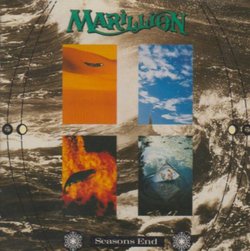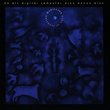| All Artists: Marillion Title: Seasons End Members Wishing: 0 Total Copies: 0 Label: Musicrama, Inc Release Date: 8/3/1995 Genre: Pop Style: Number of Discs: 1 SwapaCD Credits: 1 UPC: 738476832121 |
Search - Marillion :: Seasons End
 | Marillion Seasons End Genre: Pop
The album that introduced the new Marillion vocalist to the world. I can understand those who discards this period, without Fish, but I can also see why some people love it. Features 9 total tracks. EMI. 2000. |
Larger Image |
CD DetailsSynopsis
Album Description The album that introduced the new Marillion vocalist to the world. I can understand those who discards this period, without Fish, but I can also see why some people love it. Features 9 total tracks. EMI. 2000. Similar CDs
|
CD ReviewsAtmospheric 1980s neo-progressive rock Jeffrey J.Park | Massachusetts, USA | 06/13/2009 (5 out of 5 stars) "I actively bought new Marillion albums from 1985-1994 and was grateful to have something "proggy" to listen to during that time. I stopped however, when groups like Anglagard, Ozric Tentacles, and Porcupine Tree came to my attention. There was, and still is, something very attractive about the Marillion sound though: "sweet" melodies, fine ensemble work, pleasant vocals, and above all else, a gloominess that lends the music an emotional punch. Although the product of a different lineup, Seasons End (1989) has all of these elements and is a strong album.
The lineup includes new lead singer Steve Hogarth, Mark Kelly (synthesizers, keyboards), Steve Rothery (guitars), Peter Trewavas (bass guitar), and Ian Mosley (drums and percussion). Ian has an impressive prog resume and recorded with Trace amongst others in the 1970s. His playing with Trace is very impressive, although he seems to have scaled back his approach with Marillion. With respect to the departure of former singer Derek "Fish" Dick, who was admittedly the only distinctive singer in the whole neo-progressive genre, I feel that Steve Hogarth has a fine voice that may be better suited to the softer textures of their music. Overall, these guys are good players. In terms of the tunes, which range in length from 2:54 to 8:08, I can hear aspects of 1978-1980 Genesis, British symphonic pop, and even American stadium rock. The sound is very accessible, and while the group is not known for blinding virtuosity, the compositions are sophisticated enough that the music holds my interest - indeed the music nicely blends the "proggier" aspects of early Marillion with the softer sound of later Marillion resulting in a more diverse listening experience. The one pop track (Hooks in You) is not totally satisfying. Overall, the tracks move along at a slow to mid-paced tempo, rhythms are mostly in 4/4, and layers of marshmallowy synthesizer textures are used to generate a symphonic fullness (there is not a lot in the way of the brisk Tony Banks influenced synth solos that turned up on earlier albums). The guitarist seems to favor a heavily chorused sound on his electric and the acoustic guitar is only used sparingly (Easter is a good example). There are some arena-rock solos on the electric guitar here and there but not too many. The band gravitates towards gloomy atmospheres and quieter passages - the sad title track is a good example. In fact, it is this sadness that sets this band apart and is why I like them. This is the CD that was originally released in 1989 and does not feature any extra tracks (there is a remastered version out there). The liner notes feature lyrics, recording credits, and a few "arty" images. The album was produced by Nick Davis and the sound is muddy. The drums are loud. All in all, Marillion is my favorite of the neo-progressive outfits that popped up in the 1980s. This is a very strong album that is recommended along with the fan favorite Misplaced Childhood (1985) and Clutching at Straws (1987) (the last with Fish)." |

 Track Listings (9) - Disc #1
Track Listings (9) - Disc #1